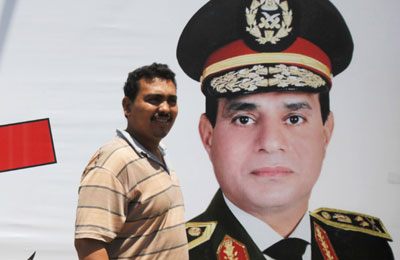
An army supporter walks in front of a poster of Sisi
Egypt has 'room for all' says army chief
Cairo, August 18, 2013
Egypt's army-backed rulers met on Sunday to discuss their bloody confrontation with deposed President Mohamed Mursi's Muslim Brotherhood amid contrasting proposals for compromise and a fight to the death.
In a speech to military and police officers, army chief Abdel Fattah el-Sisi promised to crack down on anyone using violence, but also struck an apparently inclusive note, telling Mursi's supporters: "There is room for everyone in Egypt," according to the army's Facebook page.
The Brotherhood, under huge pressure since police stormed its protest camps in Cairo and killed hundreds of its supporters, said it was planning more marches to demand the reinstatement of Mursi, ousted by the army on July 3.
Egypt, the most populous Arab nation, is grappling with the worst bout of internal bloodshed in its modern history, just 30 months after President Hosni Mubarak's overthrow was hailed as heralding democratic change across a region ruled by autocrats.
Around 800 people have died, including about 79 police, in a crackdown that has earned the military rulers condemnation from major aid donor the United States and the European Union, but support from wealthy Arab allies led by Saudi Arabia, which fear the spread of Brotherhood ideology to the Gulf monarchies.
Before the cabinet met, the liberal deputy prime minister, Ziad Bahaa el-Din, had floated a conciliatory proposal, seen by Reuters, advocating an end to a state of emergency declared last week, political participation for all parties and guarantees of human rights, including the right to free assembly.
But his initiative seemed at odds with the position of Prime Minister Hazem el-Beblawi, who suggested outlawing the 85-year-old Brotherhood, which would effectively force it underground.
"There will be no reconciliation with those whose hands have been stained with blood and who turned weapons against the state and its institutions," Beblawi told reporters on Saturday.
A middle-ranking security officer, who asked not to be named, said there would be no let-up in the anti-Brotherhood struggle, regardless of any political proposals or international criticism.
"PEOPLE SUPPORT US"
"We have the people's support. Everybody is against them now as they see the group as an armed terrorist organisation with no future as a political power," the officer said.
The capital's frenetic streets, unusually empty in the past few days, were returning to normal, although the army kept several big squares closed and enforced a dusk-to-dawn curfew.
At night, soldiers standing by armoured personnel carriers man checkpoints and vigilantes inspect cars for weapons.
Banks and the stock market reopened for the first time since Wednesday's carnage, and shares plunged 3.9 percent.
"As long as we have bloodshed on the streets, it takes away any reason for foreign and regional investors to buy in Egypt," said Amer Khan, director at Shuaa Asset Management in Dubai.
Foreign Minister Nabil Fahmy sought to pre-empt any Western attempt to use aid flows as a lever by saying he would review all such assistance to see "what aid is being used to pressure Egypt and whether this aid has good intentions and credibility".
He told a news conference Egypt was not seeking to reshuffle its friendships, but would widen them to increase its options.
"The relationship between Egypt and the US has been there for a long time. It has been through ups and downs in the past. We hope things will go back to normal promptly," Fahmy said.
ACCUSATIONS OF BIAS
As part of a concerted push to drive home the state's narrative of events, his aides distributed a pack of photos said to show Muslim Brotherhood members carrying firearms and wooden staves - and in one picture a black Al Qaeda-type flag.
The Brotherhood denies links to the global militant network.
Officials have accused Western media of biased coverage of the unrest, saying they have ignored attacks on police and the destruction of churches blamed on Islamists.
The army crackdown has drawn wide support among Egyptians tired of political turmoil and hard-hit by its economic fallout.
"I tried to sympathise with the Brotherhood but could not," said Hussein Ismail, 32, on holiday from his job in the Gulf, who took part in anti-Mursi protests late last year.
"They stormed our protests at the presidential palace, they hit our women protesters," he said.
"They defended the army when they attacked and killed Christian protesters in 2011. They slammed liberals, women and Copts when they asked for more freedoms, rights. Do you think those people really cared about democracy?"
On Saturday, Mursi supporters exchanged fire with security forces who eventually cleared protesters from a central Cairo mosque where they had sought refuge from clashes the day before.
At least 173 people were killed on Friday during a "Day of Rage" called by the Brotherhood two days after police destroyed its protest camps. The Brotherhood put the death toll at 213 protesters. Police have since arrested more than 1,000 Brotherhood "elements". The state news agency said 250 faced possible charges of murder, attempted murder or terrorism.
The Brotherhood has called for daily street protests this week, but there were no reports of trouble by Sunday afternoon. - Reuters







